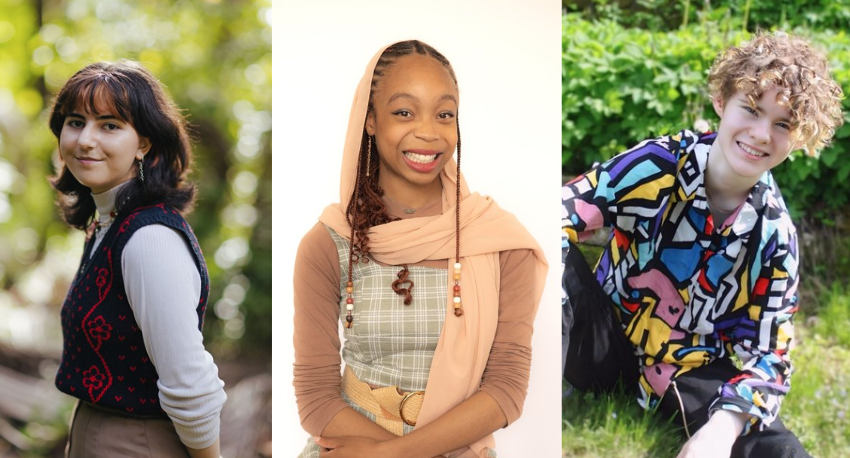Beloved Arise Youth Ambassadors On Intersectionality of Queerness and Religion

Beloved Arise is a national organization devoted to empowering queer youth of faith. Through their Youth Alliance and Mentorship programs, they work to ensure queer youth can practice their faith openly and safely. I talked to ambassadors Sid, Mia, and Sabrina about their personal experiences and their advice for members of their communities.
Sid High (he/him) is a transgender and Christian activist. When he was 16, he and his friends worked with their local library to bring informational booths and a drag queen story hour to their community. He is now an ambassador for Beloved Arise, sending letters of encouragement and advice to youth. He also uses his social media platforms to spread awareness surrounding autism, queerness, and faith.
High grew up around Christianity but never felt pressured to go to church with his family. Around the age of 14, he became more curious about Christianity and found his journey with queerness and religion intertwined. “When I would see people holding signs saying ‘Jesus doesn’t love you,’ my first thought was that doesn’t make sense because I’ve felt nothing but love from God. I never felt any judgment come from [him].”
Sid believes fellow Christians should preach the welcoming and loving parts of Christianity rather than spewing the opposite. He finds that homophobia only turns people away and prevents people from joining the religion. “If you go up to someone and say, ‘You’re going to hell for this,’ no one’s going to [say], ‘Oh, I love Jesus.’ [That’s] not how the world works. In the New Testament, what did Jesus do? Stand up for the oppressed, and then you see people use his words [and] his scripture against people, both being mistranslated, [which] blows my mind.”
Mia Miller (they/them) is a queer Muslim activist who was recently featured in Teen Vogue for their op-ed What I Wish I Knew Before Coming Out as Queer. In Miller’s op-ed, they detail the hardships associated with being a queer Muslim and Black American in Texas, along with their coming-out journey. While hesitant about the potential reaction to their op-ed, Miller felt supported by their family and friends.
The concept of “coming out” is well known in the LGBTQ+ community, but Miller feels they had to come out more than once. “I had a second coming out because I reverted to Islam. So I was saying, ‘Oh, yeah, now I’m Muslim.’” Miller has to live in a world with both homophobia and Islamaphobia, which they feel is especially magnified by current events. “Even in the queer community, there’s still a lot of racism towards people of color specifically, black folks. People forget that just because they’re members of a historically marginalized community, they [can] still be racist, they [can] still be Islamophobic.”
Not everyone in the queer community can understand all of the experiences and discrimination that Miller has gone through. In their life as an activist and member of the queer community, Miller takes the time to educate fellow community members about their religious beliefs. “There’s this narrative that Muslims are super old-fashioned in their beliefs and traditions, which isn’t true. We are super diverse, just like any other religious community.”
“I think it’s important to treat each other with respect and dignity, and still come to a place where you can actively listen.” When it comes to the differing views within the Muslim community, Miller finds the best course of action is to focus on yourself. “Don’t compare yourself to others, focus on your [own] specific journey.”
Sabrina Hodak (she/her) is a bisexual and Jewish activist who utilizes her platform to educate people on Judaism and the intersectionality of Judaism with queerness. “In the queer community, it’s important for us to be open-minded, kind, and respectful of people who are queer and practice faith. [Just] as we expect them to be for us.”
Hodak recalls her old youth group mentors being “tolerant and kind,” but not accepting. She claims they believed being queer and Jewish were “mutually exclusive,” and that being queer was “a lifestyle choice.” Today, Hodak calls her relationship with Judaism “an adventure.” She is still reevaluating a lot of the beliefs engrained in her by her old mentors and remains uncertain about more Orthodox spaces.
Despite past experiences, Hodak has found welcoming spaces online. She hosts Instagram lives with other queer Jewish creators and engages with queer youth on Discord channels through Beloved Arise. “It has been great to hear about the diverse upbringings of different Jewish queer people and to give voice to these creators about their experiences.”
When asked what advice she gives to the youth she works with, Hodak says, “Do not let other people rule the way you live your life.”
“What it has come down to is to stop asking for permission to exist the way I am. [To] just be and to find what is right for me, what works for me, and what is meaningful to me.”
Images courtesy of Beloved Arise




